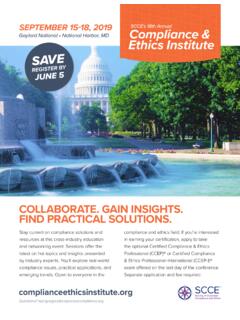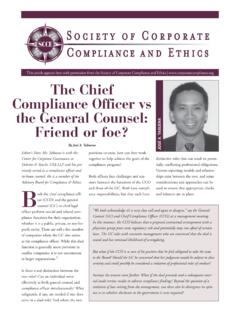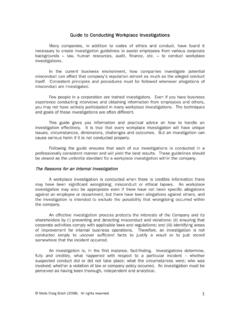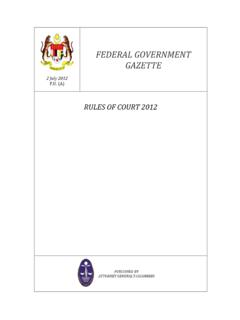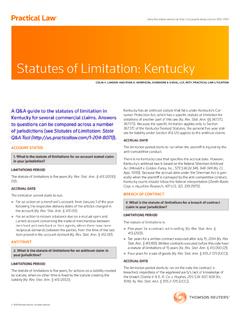Transcription of United States Jurisdiction Abroad
1 United States Jurisdiction Abroad The United States applies their Jurisdiction Abroad under several instances. This is something very important for based corporations with global operations to understand, since they might be in a situation where Jurisdiction applies as a result of actions taken by one of their subsidiaries in a foreign Jurisdiction . The issue presented in this paper is when the can exercise Jurisdiction Abroad , so we will discuss the protective principle and universality of the five bases of Jurisdiction as described below: Five Bases of Jurisdiction Territoriality Nationality Passive Personality Protective Principle Universality Presumption - Law Does Not Apply Abroad In general, absent a clear indication of intent for a statute to apply Abroad , there is a presumption that laws do not apply Abroad .
2 In general, there is a presumption that laws do not apply outside of the United States ; thus, absent a clear intent for a statute to be applied Abroad , courts will ordinarily interpret statutes to apply domestically, and not Abroad . F. Hoffmann-La Roche Ltd. V. Empagran , 542 155, 164 (2004). The purpose is to avoid unintended conflict with laws of foreign nations. v. Arabian American Oil Co., 499 244, 248. However, it is important to note that there are certain circumstances in which the United States may apply domestic law Abroad : For example, the United States may give extraterritorial effect to laws in cases involving: 1.
3 Citizens Abroad . 2. foreign citizens employed by companies Abroad . 3. Violation of certain laws, such as: foreign Corrupt Practices Act (Dealing with bribery) Export Administration Act of 1979 (Dealing with boycotts) Iranian Assets Control Regulations (Dealing with the response to the hostage crisis) Civil Rights Act, the National environmental Policy Act, and drug enforcement laws. Page 2 Asserting Jurisdiction Abroad The United States may assert Jurisdiction over the conduct of citizens Abroad , and over the conduct of others against citizens Abroad .
4 Nationality permits a state to assert Jurisdiction over the conduct of nationals, even when they are acting outside of the state. In Blackmer v. United States , 284 421, 438-41 (1932), the filed criminal charges against a United States citizen who failed to respond to subpoenas served upon him while traveling in France. There, the court reasoned that although Blackmer was Abroad when he was subpoenaed, he remained a citizen subject to the laws of the United States . Similarly, a corporation is considered to have the nationality of the state in which it is incorporated.
5 Conversely, passive personality authorizes States to assert Jurisdiction over offenses committed against their citizens Abroad . Here Jurisdiction is based on the nationality of the victim. The United States may assert Jurisdiction Abroad if doing so is necessary for its security or government functions. Under the protective principle, a state has Jurisdiction to prescribe a rule of law attaching legal consequences to conduct outside its territory that threatens its security as a state or the operation of its government functions. In v. Pizzarusso, 388 8, (Ct.)
6 App., 1968), the court affirmed the conviction of a citizen indicted and convicted of knowingly making a false statement to an American consular officer, under oath, in a visa application. The United States , and any other country, may assert Jurisdiction over anyone committing a heinous crime, regardless of the location of the crime or nationality of offender or victim. The universal principle recognizes that certain offenses are so heinous and so widely condemned that any state, if it captures the offender, may prosecute and punish that person on behalf of the world community, regardless of the nationality of the offender or the victim, or the location of the crime.
7 Examples of offenses covered by the universal principle include: Privacy Slave Trade Terrorism Page 3 Certain Laws have Extraterritorial Effect. In 1984 Congress expanded the Age Discrimination in Employment Act (ADEA) to permit limited extraterritorial application to citizens working for companies or their subsidiaries. In Denty v. SmithKline Beecham Corp., 109 147, 150, the Third circuit stated that The ADEA had extraterritorial application, but only in those situations where an American citizen was working for an American company on foreign soil.
8 The court further stated that the statute was carefully limited to companies and their subsidiaries with respect to claims by citizens. In general, absent a clear purpose to extend to extraterritorial claims, the courts will rarely apply labor laws to protect foreign employees employed Abroad . However, where a court finds clear extraterritorial intent, it will apply labor law Abroad . For example, in Kollias v. D & G Marine Maintenance, 29 67, 73 (1995), the Second Circuit found the requisite intent when it examined the Longshore and Harbor Workers Compensation Act.
9 There, the statute made specific reference to where injury on the high seas would be adjudicated and the legislative history and regulatory interpretation further suggested extraterritorial intent. Nonetheless, the Second Circuit cautioned that few, if any, statutes would avoid the presumption against extraterritorial application. Additional examples of laws that have extraterritorial effect include, but are not limited to: the foreign Corrupt Practices Act (dealing with bribery), the Export Administration Act of 1979 (dealing with boycotts), the Iranian Assets Control Regulations (dealing with the response to the hostage crisis) and the Civil Rights Act, the National Environmental Policy Act, and drug enforcement laws.
10 The requirements for extraterritoriality are not as stringent in cases of criminal law. The importance of enforcing the criminal law often results in extraterritorial applications that the court might forego in a purely civil context. Illustrating the weight of criminal law, drug enforcement laws are often given extraterritorial application. Recent legislation States that computer security specifically applies to foreign commerce or some foreign activity. Thus, in Four Seasons Hotels and Resorts v. Consorcio Barr, , 267 1268 ( Fla. 2003), aff d in part, rev d in part, hotel licensees were liable in a federal civil action for interception of the licensor s electronic communications.
